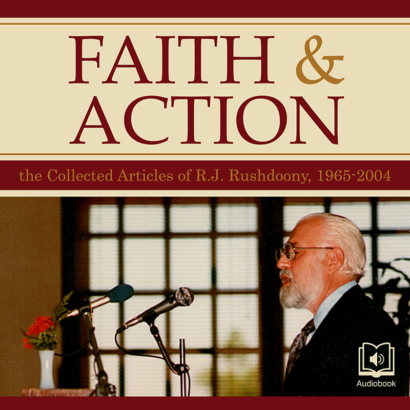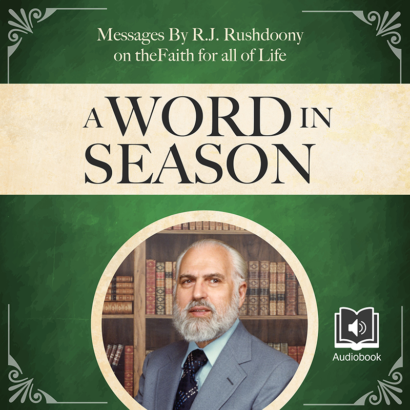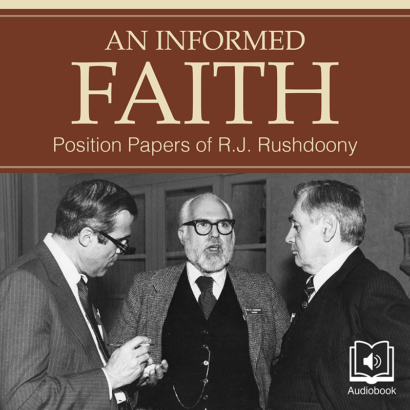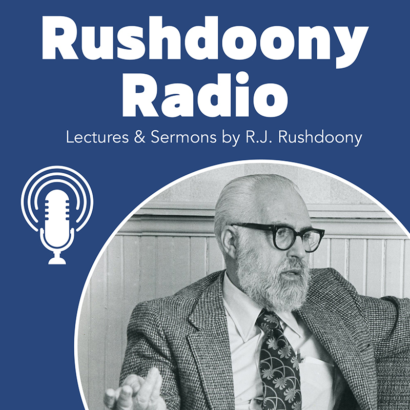
R is for Raising Rebels
• Jul, 23 2024
In this episode of "Preschool Pioneers," host Jeremy Walker discusses the crucial topic of "Raising Rebels: The Difference Between Conviction and Rebellion and How We Can Teach Our Children to Know the Difference." Emphasizing the role of parents as primary educators, Walker explores the significance of religious education at home and the broader scope of teaching beyond institutional settings. He delves into Romans 13 to explain how Christians should understand authority and God's providential plan, teaching children to live wisely and faithfully within this framework. The episode encourages parents to instill confidence and faith in their children, ensuring they understand that both good and bad events are part of God's divine plan.
Hosted by
Husband, Father, Pastor, Teacher, Podcaster, and Christian Education Advocate
- Series: Preschool Pioneers
- Topics:
Jeremy Walker (00:15):
Welcome back to another episode of Preschool Pioneers. I'm your host, Jeremy Walker. You can follow us on our parent network, CR101Radio, on social media such as Facebook, Twitter, Gab, and YouTube, and you can subscribe to this podcast to the preferred platform so you never miss an episode. Visit cr101radio.com for these links.
(00:45):
Welcome back, everybody, to Preschool Pioneers. We are here with another episode entitled R is for Raising Rebels: The Difference Between Conviction and Rebellion and How We Can Teach Our Children to Know the Difference. I want to thank everybody for joining me. Again, this is going to be what I think, a very crucial episode in the concept of rearing children and giving advice. If I could say one thing that you can do to promote a child, it was in this episode. If you want your child, your children, your students to have a better, brighter future, everything in this episode is crucial, absolutely crucial to understand, to help make that a reality.
(01:39):
Now, here on Preschool Pioneers, we like to talk about why Christians should become teachers. One of the very simple reasons is that it is our mandate. We are teachers. Parents, in particular, are teachers first and foremost. They are caretakers, of course, of their children, but they are the primary educator of their children. Sadly, no one says that anymore. They think about teaching, they think about education, and they think about some kind of an institutional school, some kind of a setting where you go and you're in a classroom and there's grade levels and there is a grading system, and you're going to get A's, B's, and C's, or 100% reading, writing, and arithmetic.
(02:31):
Education is much, much bigger in scope and in importance, and one of the most basic fundamental things that a parent teaches is religion. That's right. Let me say that again. The family and parents, their primary goal is to teach religion. If you did not know, all schools do the same. That's right. Let me say that again. All schools are religious institutions. The only question is not, are they religious or not religious, but what religion are they teaching?
(03:11):
Here on Preschool Pioneers on this episode, we're going to be talking about raising rebels inside the Christian community and outside. This is a big important subject. People want to know what to stand for and how to stand up for what they believe, or what I would call your convictions, your religious convictions. I'd like to start this episode with my scripture passage in Romans 13, and there are going to be 14 verses to this because this is, as I said, one of the most crucial things you will need to teach your children about the world, their place in it, and what it means. How are they supposed to live and move through this world? Because this scripture passage gives children, adults, all of us a firm grounding in what we see in the world and the confidence of what we can do to live successfully in this world.
(04:16):
We know that the world is full of sin. We know that the world is full of corruption, and that's all people talk about. But they very rarely, if ever, actually talk about a solution to that problem, to that corruption. What is your response to that? Everybody wants a political solution, a political answer to that question. Many people, especially when you go to the liberal left, you'll see people going into rallies. You see people protesting. They always have to have a cute little quote. They can chant louder and louder and louder when they want to protest. They want to block highways, they want to maybe burn things down, and what they call mostly peaceful protests.
(05:07):
What is the Christian's answer to all this? When there's corruption, what are they supposed to do? How are they supposed to stand up? Many Christians like to use the scripture passage very wrongfully, of course, that it's their job to listen to God more than men. This is true. The problem is, how are they doing that? And, of course, what are they actually promoting when they say that? Romans 13 is one of the most contested passages in the Bible. Mostly because it is not something that covers the subject the way people would like to cover the subject. Some people will take it and completely read into it, while most completely ignore it all together.
(05:58):
So let's go ahead and jump into Romans 13:1 and following, "Let every soul be subject unto the higher powers. For there is no power but of God: the powers that be are ordained of God. Whosoever therefore resisteth the power, resisteth the ordinance of God: and they that resist shall receive to themselves damnation. For rulers are not a terror to good works, but to the evil. Wilt thou then not be afraid of the power? Do that which is good, and thou shalt have praise of the same: For he is the minister of God to thee for good. But if thou do that which is evil, be afraid; for he beareth not the sword in vain: for he is the minister of God, a revenger to execute wrath upon him that doeth evil. Wherefore ye must needs be subject, not only for wrath, but also for conscience sake. For for this cause pay ye tribute also: for they are God's ministers, attending continually upon this very thing. Render therefore to all their dues: tribute to whom tribute is due; custom to whom custom; fear to whom fear; honour to whom honour."
(07:15):
"Owe no man any thing, but to love one another: for he that loveth another hath fulfilled the law. For this, Thou shalt not commit adultery, Thou shalt not kill, Thou shalt not steal, Thou shalt not bear false witness, Thou shalt not covet; and if there be any other commandment, it is briefly comprehended in this saying, namely, Thou shalt love thy neighbour as thyself. Love worketh no ill to his neighbour: therefore love is the fulfilling of the law. And that, knowing the time, that now it is high time to awake out of sleep: for now is our salvation nearer than when we believed. The night is far spent, the day is at hand: let us therefore cast off the works of darkness, and let us put on the armour of light. Let us walk honestly, as in the day; not in rioting and drunkenness, not in chambering and wantonness, not in strife and envying. But put ye on the Lord Jesus Christ, and make not provision for the flesh, to fulfil the lusts thereof."
(08:26):
That is Romans 13:1-14. Now you can see how many people, they're, of course, going to be reading these types of things, and they're going to pick and choose the verses that they like and the ones that they want. We are going to be giving our children, or at least we should, and our students a proper, grounded foundation about how the world really works. There's a difference between what you think or what you would like it to do and how the world actually operates. Whenever our children see the world, they hear news and events, and here, as of our date right now, we're in July, and there was an assassination attempt on President Trump. It did not succeed. He's very much alive, and the political winds have changed, and, of course, the other side, the liberal side of America, is falling apart everywhere. Of course, we like to see, many people are starting to see hope.
(09:31):
The problem is that people can get disheartened when things are not, quote, unquote, "going their way." That's right. Or they are going to see God's hand in the providence of the bullet miraculously missing President Trump, which it was. Yet, at the same time, they can't also see God's providential hand in things that they would consider to be negative things, disasters, destructions, or judgements. They can't give God credit for both. For our children, it is a very big necessity that we teach them that God's hand governs all. That's right. It's not just in the small things like what we saw, or somebody might call it a big thing where the bullet barely grazed the president's ear and he, of course, is now very much alive. But he was also, in the fact, that other people at the same rally did not come away alive. That was also in God's providential plan. All of it is for the good, for people who are God's children, and it is all for the evil, for those who are His enemies. That's right. All good for Christians, which are God's people, all bad for those who are His enemies.
(10:56):
This is a very important perspective that you are going to have to... If you are a parent or a Christian teacher, you need to give this to your children. It gives extreme comfort, extreme comfort to know that the world is not out of control. Extreme comfort. When things don't seem to be going well, they don't have to go to God in despair. They can go to God in faith, not necessarily with smiles and laughter whenever tough times come, but they can come to God in faith knowing that everything is happening for a good reason.
(11:35):
The same when people can cheer and thank God that President Trump was not murdered on stage on live television. They also have to praise God like Job did whenever a tornado comes to his home, and destroys the home, takes the life of 10 of his children. That's right. Then he lost all of his wealth on top of his children, and then he lost his health on top of that. When it came time, when all these disasters, all this negative impacting his life is going on, he's given the chance to ask God why. He puts his hand to his mouth and refuses to ask. He says, "I repent and dust in ashes, things that are too high and wonderful for me to understand." Job could put his faith not in the knowledge of what God was doing, but that it is into faith, God knows what He's doing even when you don't.
(12:36):
Romans 13 here covers the subject matter of people that are in charge. This is talking about during the time in Rome. This letter was written by Paul to the Romans, and Rome was not favorable to Christians. People like to bemoan the concept in America today, around the world, of all the evils that are out there, and those are real and legitimate, but people are not being burned at the stake. They're not being pulled into coliseums and having animals rape them and then murder them. That's not happening. They're not being beheaded and butchered by the government. That's not what is going on in the United States of America today. The current environment and culture that we find ourselves in is so far different and remove, we can't even possibly think, can't possibly think about what the people in Rome, the Christians in Rome, what they endured and the faith that Paul was trying to tell these people they had to have in not thinking that the Romans were in charge by accident, to not think that their solution is to obey God rather than men.
(13:48):
So because Rome is doing evil, then we, as good Christians, we must pick up the sword and correct all the wrongs. We are going to fix all the evils of the Roman government, toss off this tyranny, and we are going to be a free people able to live our lives without tyranny and be able to live our faith without being executed and murdered. This is not what Paul was talking about. He wanted to give them the perspective of reality that every single person has a position that was given to them by God. The power that they exert, either positively or negatively, is by permission and ordination of God. So all the terrible things that befall the first century Christians was by God's ordination, one for their blessing and two for the people doing the evil for their judgment.
(14:49):
This is the proper perspective. We don't have to spend our time worrying about politics. We should be, of course, knowledgeable about the subject, the culture, and the environment that we find ourselves in, but not obsessive, and certainly not those looking at it without hope or those who are looking at with trepidation as if we don't know what's going to happen. God's not being honored in America today, and we must do something about all this to get it all fixed. That's not true. God has everything, absolutely everything, under control, and God tells us to be subject to these rulers. Now, this was Rome he was talking about, Caesar he was talking about. Some people say, "Well, what should we do then? Are we just supposed to sit back and do nothing?" That's also not the example of the Bible. But once again, as I mentioned at the very beginning, people like to come to the Bible and they have an idea that they themselves believe to be true, and then they go to the Bible trying to justify their ideas.
(15:54):
That's called eisegesis versus exegesis. It's a theological term that says you try to put your thoughts, your interpretation into the Bible, versus reading the Bible and it giving you what you're supposed to believe. So here in this concept, you can take all the Bible as your example. Paul also, many times, many times had problems with people who tried to hurt him. In one case, in particular, Roman soldiers were going to beat him, and he looked at the Roman soldiers without resisting, wasn't trying to run away. He asked them a simple question, "Is it lawful for you to beat a Roman citizen?" And for them, of course, it was very illegal. They would get in severe trouble if they decided to try to beat a Roman citizen. This was not lawful for them, the soldiers, to do this, and they did not. Paul used the current environment and law structure that he lived in to protect him and others.
(16:52):
There were times where he was put into jail by the Jewish authorities. He did not try to escape. He let them jail him. When he was jailed, an angel came and opened up all the doors, and they did not try to flee. In fact, a convert was made, the jailer, because they didn't run out. The poor man was almost going to kill himself because he thought, "Surely all the prisoners would escape, for the doors' wide open and I'm going to die." So he was going to take his own life. But Paul calls out and says, "Don't worry, we're all here." And, of course, the man was converted and his household. There was another time where a similar thing happened, but this time they were told to leave and to continue preaching.
(17:36):
Now, this time, this is where that Bible verse comes in, that we are supposed to obey God rather than men. The Jewish people told them to stop teaching, and God had released them from prison, told them to leave and said, "Go preach." This was the structure in which they were told. Divine command, at that time, to disobey that specific authority at that specific time. This cannot just be given to all of us. It was very specific at a very specific time. Different timeframe? Paul was also being hunted down. Men had taken pledges that they were going to not eat until they murdered Paul. So Paul had gone to the Roman government and said, "I appeal to Caesar." And he went under the protection of the Roman soldiers in the Roman guards and protected himself from the Jewish authorities who were trying to murder him.
(18:32):
So Paul, very much so, lived in a worse time politically than we do, but he did not do so without hope. He did so with finesse. He did so with faith. He used everything in his power, knowing that God was in charge, to properly live. He was put in jail and eventually executed by the Romans. But while he was in jail, he continued to do his job. He made use of every opportunity within the subject matter that he found himself in and never gave up hope. Chains on your arms and your legs, prison doors that are locked, this is not the slavery and the tyranny that our children need to be concerned about. The slavery and the tyranny that we preach against and teach our children about is the slavery and tyranny of sin, not the sin of others but the sin within ourselves. That's why the rest of Romans chapter 13 talks about what? You keeping God's commandments. You loving your neighbor. The fulfilling of the entire law means you're keeping the commandments towards others, and that is defined as love, not some emotion.
(19:46):
We teach our children they are supposed to love everybody, but that means the keeping of the commandments and the commandments, teach us who are good, who are not good, who are righteous and who are not righteous, who to be around, and who to separate ourselves from. We are supposed to be working on ourselves, being concerned about being under the tyranny of sin, underneath the subject of sin. This is why he talks about us putting on the armor of light to get rid of the works of darkness from ourselves, to be renewed in this world, to be a shining light in darkness. That's right. Do not give provision for our flesh or the lust that it has. We are supposed to be free from sin. God is in control of the world. This is what we need to give our children a vision for.
(20:39):
Everything is perfectly under control. Everything. We are supposed to live amongst other men with wisdom and savvy like Paul did, but not in rebellion, thinking that we must overthrow somebody that they have a power that was not given to them. Far from it. To try to overthrow by violence is to try to attempt to overthrow God's ordination and providence, and this is a horrible evil thing. It should be something that is never taught within any Christian circle in any Christian home. What's worse is, you can stand there in front of evil men and say, you hold power only by permission of God.
(21:21):
But hold on a minute, didn't that take place? Oh, I forgot. It did. Jesus Himself stood in front of Pontius Pilate, and He says, "I have the power to release you or to kill you. Speak to me." And Jesus very confidently said, "You have no power but what's given to you from above." In other words, "I'm here not because you are holding Me here. I'm here in My position because this is God's providential plan for Me in My life." That is what we must teach our children. There is nothing that happens to you that is not ordained of God. No one can touch you unless God allows it.
(22:05):
The biggest way that God is going to allow evil men to get you and your children isn't because they're the boogeyman who's out of control. Even Satan had to have permission to touch Job. It's very important to have good theology because it gives you a proper perspective on life, and how can you be a completely full-orbed parent, a full-orbed equipped Christian teacher? Unless you understand the Bible and what it teaches you, grounds you in your faith, grounds you in the confidence of God's providential plan, and master control of everything.
(22:41):
No one can scare you. No one can intimidate you. There are no powers that can touch you unless God allows it. That does mean the good and the bad. It means the providential plan of President Trump avoiding assassination, and it means accepting God's plan that 10 of your children dead from a whirlwind is a good thing somehow and a blessing. That takes immense faith. But if your children are going to live successfully in this world, this is how they must believe and then what they must believe, about the world and how it works. This is fundamental to their success in life. As I mentioned before, the only way that somebody's going to touch you is when you disobey God yourself. That's right. I won't go into it, but the story of Balaam was that, versus the Israelites, they had to teach them to break God's commandments willingly on their own, and then God refused to protect them and allowed evil men to then hurt them.
(23:51):
No, we can be under the wings of Christ. We can teach our children this confidence, and we ourselves. It can help you as a parent. What kind of confidence is that? Knowing that your children are perfectly safe. You are your child's primary guardian, but you're not the only guardian. God gives you responsibilities, and the primary one is their education. So maybe, just maybe, you should take the confidence that you have in Christ. If you don't have it, you should get it, and then transmit that to your children, and they can be wonderful soldiers for Christ and have a successful future in building the kingdom of God, and you got to help. It's a wonderful calling, and it's a wonderful blessing to be a Christian parent and a Christian teacher. Thank you again for joining me. This is Jeremy Walker for Christian Preschool Pioneers. Thank you, and God bless.
More podcasts in series

B is for Behavior
Jun 10, 2025

A is for Apprenticeship
Mar 03, 2025

Z is for Zombieland
Dec 19, 2024

Y is for Your Body, You Choice
Nov 10, 2024

X is for Xenophile and Xenophobe
Oct 21, 2024

W is for Whiteness
Sep 23, 2024

V is for Values
Sep 16, 2024

U is for Uncommon
Sep 07, 2024

T is for Transformers
Aug 26, 2024

S is for S.T.D.
Jul 24, 2024

Q is for Quitting
Jul 22, 2024

P is for Pyramids
Jun 26, 2024

O is for Opportunity
Jun 19, 2024

N is for Nationalism
Jun 13, 2024

M is for Mind Magnets
May 19, 2024

L is for Lowering Standards
May 12, 2024

K is for Kool-Aid
Apr 28, 2024

J is for Justified
Apr 15, 2024

I is for Integration
Apr 08, 2024

H is for Homeschooling
Apr 01, 2024

G is for Godly Fathers
Mar 25, 2024

F is for Flat Earth
Mar 18, 2024

E is for Economics and Entrepreneurship
Mar 12, 2024

D is for the Department of Children and Families
Mar 12, 2024

C is for Childbearing
Mar 12, 2024

B is for Bears, Beets, and Battlestar Galactica
Mar 12, 2024

A is for Abandonment
Mar 12, 2024









